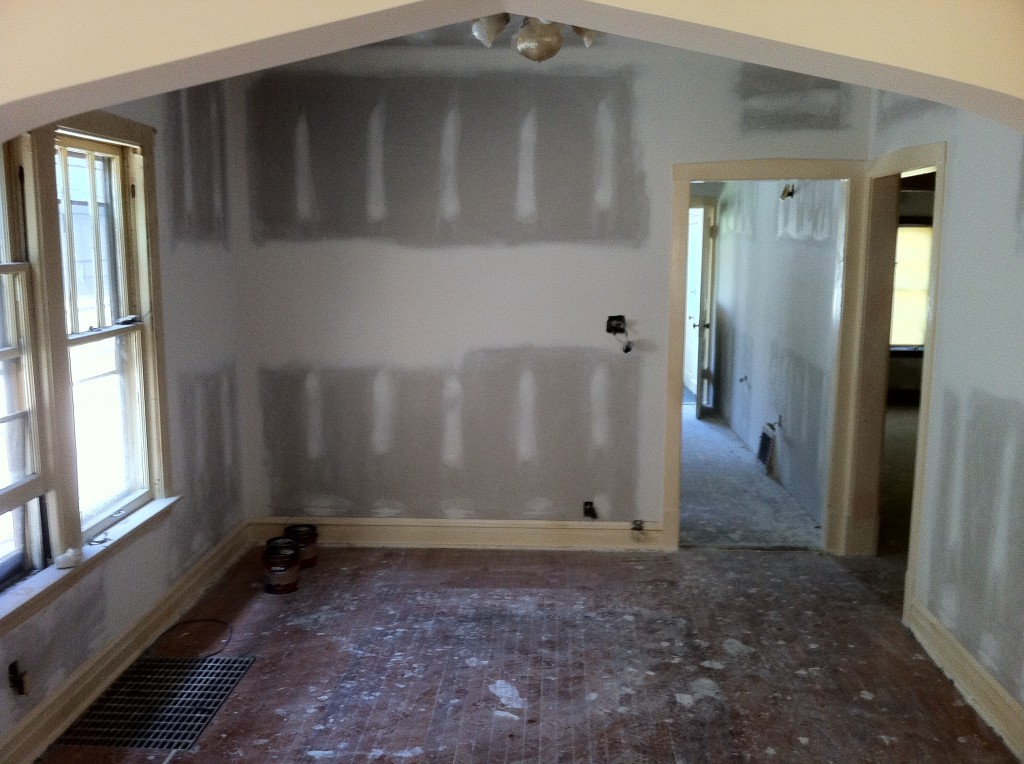By Trent Modglin
So you’re pondering the fixer-upper project. You see the potential to flip a property and make a healthy profit in a short amount of time. Or perhaps it’s just a gut rehab challenge you’ve been looking to tackle on your own home, drill and floor sander in hand.
Considering the high prices in the housing market, especially in certain high-demand Chicago neighborhoods, many buyers are unlikely to find exactly what they want at a price they can afford unless they refurbish or build it themselves.
Whatever the reason you desire to get dusty, there are factors you should consider. Take it from someone who converted an outdated studio condo on Lake Shore Drive into a pseudo one-bedroom (angering his high-rise neighbors in the process) and then six years later, decided to completely gut a 90-year-old north side house just days after moving in post-honeymoon.
What follows is not a by-the-book checklist on home rehab projects. And it’s in no way meant to discourage you from going all in. It’s simply a quick guide that should help you determine if it’s the right move for you.
1. Have a well-thought out plan and get plenty of estimates and opinions
Sounds simple enough, sure, but you’d be surprised at how many people jump right in and start knocking things down before they determine what they want it to look like when it’s finally complete. Know this: It will cost a significant amount more change a project in the middle stages than it will to execute it correctly from the beginning.
If you’re hiring part or all of it done, get a minimum of three estimates from reputable companies or contractors. If you like what your neighbor or brother did to their place, don’t hesitate to get a referral.
2. Know what popular trends are and be reasonable with your decisions 
It’s vital to realize where your money is being spent relative to where you’ll see the value increase of the property. Essentially, it’s about spending money upgrading what will bring you the most value in return.
Ask any realtor and they’ll tell you that, besides location, the ease at which a property sells largely comes down to four factors in the current market. Four things that can possibly make the difference between two days on the market and two years on the market. Updating the kitchen, updating the bathroom, quality hardwood floors and a good paint job. Surprisingly, it’s often just that simple.
Also, when you’re rehabbing a property for yourself or to flip, remember to be reasonable and ask around to find out what the current curb appeal is. In other words, sacrifice something you’ve always wanted for your man cave in favor of a trend the general populous will be looking for in case you go to sell. If you sink $50,000 into something only you desire, it may only be worth $20,000 to someone else.
3. Know your limits from a financial standpoint
Sure, it would be great to give a contractor a blank check and tell him to go to town on your condo to bring it into the modern age, but that’s not a reality for the majority of us. You have to stay within your financial means, which may be a $1,000 line of credit at Home Depot for now. If you can’t knock everything out at once, pick the room that you use most often and start there.
One regret of mine, and especially my wife’s, is that we ran out of money gutting our 90-year-old Chicago home before we got to the kitchen. Although it was needed, the healthy price tag on replacing all the siding and 26 windows took a massive chunk from our budget at the outset. We did well with affordable drywallers, electrical work and carpet installation, and I’ve done a fair amount of work myself, but to have the same kitchen that the 85-year-old previous owner left us (we’re talking straight out of the ’70s) is no fun after two years of calling it our home.
There’s nothing wrong with prioritizing or tackling your rehab project room by room when you can afford it. It’ll likely keep you from eating grilled cheese sandwiches every night and make you appreciate it that much more when it’s complete. Can the deck withstand another summer in the sun when the crack in the basement floor or the ancient cabinets should be addressed first? Something to think about.
4. Know what you can do, and what is best left to someone else 
I’m good at little things, like tiling, painting, some basic carpentry and landscaping, etc. But I’m realistic enough not to go anywhere near electrical issues or major plumbing, roofing or foundation work. It’s just not something I’m comfortable with, and I’m OK with that.
And that’s a good first step: The acknowledgment of knowing what you can handle and what you should leave to a professional. If something is above and beyond your skill level, hire it done right if you can afford to. If it’s something you can learn about through the internet, your cousin Joe or a do-it-yourself book, like tiling a bathroom or installing baseboards, save some cash and jump in there.
Just don’t let ego get in the way. You want it done correctly the first time, saving you a lot of money and hassle. And you can’t brag about a project that looks like someone did it blindfolded.
5. Go 20-30 percent above your estimate. Seriously
I know, I know, I’m sure you’re great at setting a budget, and you’ve priced everything out three times. But if your project is more than just new potted plants for the porch, chances are, some additional costs are going to sneak their way into your master plans. They always do, whether it’s the nail gun rental you didn’t anticipate, coming up short on drywall or realizing the electrical wiring in your basement is as old as the Constitution.
My most recent example: When having bamboo flooring installed at a condo I rent out, I expected to use a pair of four-gallon tubs of adhesive to affix the wood to the cork underlayment based on square-footage recommendations. When it was all said and done, we went through five and a half. At a ridiculous cost of $160 apiece. I have a half-tub of this specialty item sitting in my garage right now — $80 worth I can’t do a thing with. Maybe somebody on eBay just ran out and will take it off my hands.
Simply put, money set aside for the unknown in construction projects is a necessity. They’re always there.
6. Know your limits from a time standpoint
Are you in a rush to get this done before hosting the in-laws for the weekend or a Super Bowl party? Are you settling in for the long haul and prepping for a six-month battle with the second bathroom? Before you get started, set up a general timeline for when you’d like to get things done — and then give yourself a cushion.
And don’t forget, if you’re hiring different workers to tackle different aspects of a project, they easily can but up against each other in regard to scheduling. A delay in ordering windows or the arrival of carpeting can suddenly mean there are three things going on in your house when you only have the space (and patience, or money) for one.
Hiring a general contractor with experience in a multitude of areas can be a good way to keep things on track and increase efficiency. They usually work with subcontractors, hiring out smaller jobs to experts, and often excel at maneuvering schedules to work in their favor.
Additionally, if you’re going by the book, know that the city permit process can drag you down if things hit a snag. If paperwork gets hung up when contractors are ready to roll, don’t expect them to sit around in your kitchen and wait it out with you. There is money to be made elsewhere, and they won’t waste time moving on to a different project.
Mother Nature — cold, wind, rain, humidity — has been known to a throw a wrench into a seemingly logical work calendar as well, so don’t assume it’s going to be 70 and sunny every day you’re swinging the hammer.
7. Be prepared for the stress that goes with rehabbing a property
Those addictive fixer-upper and flip-this-house TV shows have a tendency to gloss over a lot of the grueling work, second-guessing and worry that go into a major rehab project. You know it’s the right thing to do, but like anything that requires a fair amount of money, time and elbow grease, there will be stress involved.
It can be taxing on a relationship, your pocketbook, your sleep patterns and general health. Are you prepared to come home from a long day at work, only to see a floor needing to be sanded, a wall to be knocked down or shutters still waiting to be hung? It can be a lot to take on, both mentally and physically, when all you want to do is lounge on the couch or play with your kids.

